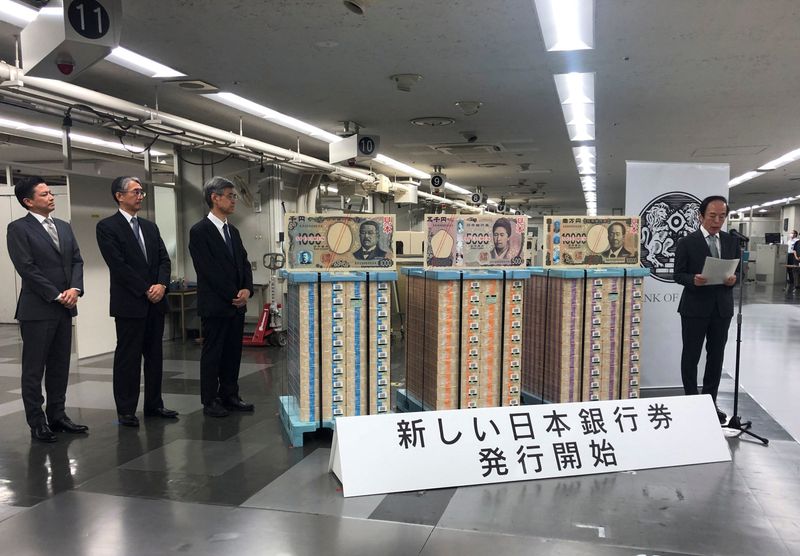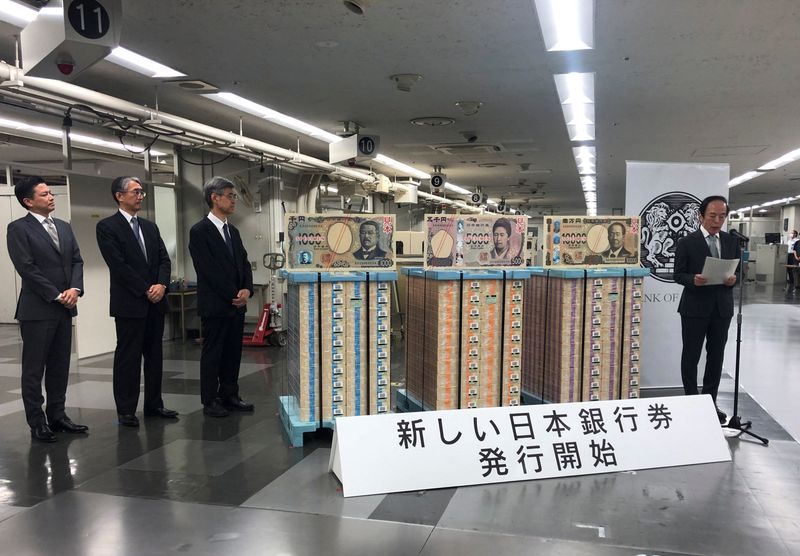
By Irene Wang and Kantaro Komiya
TOKYO (Reuters) – Japan began circulating its first new banknotes in 20 years on Wednesday, featuring three-dimensional portraits of the founders of financial and female education institutions in an attempt to frustrate counterfeiters.
The notes use printed patterns to generate holograms of the portraits facing different directions, depending on the angle of view, employing a technology that Japan’s National Printing Bureau says is the world’s first for paper money.
Though existing bills stay in use, train stations, parking lots and ramen shops are scrambling to upgrade payment machines while the government pushes consumers and businesses to use less cash in its bid to digitise the economy.
The new 10,000-yen ($62) note depicts Eiichi Shibusawa (1840-1931), the founder of the first bank and stock exchange, who is often called “the father of Japanese capitalism”.
The new 5,000-yen bill portrays educator Umeko Tsuda (1864-1929), who founded one of the first women’s universities in Japan, while the 1,000-yen bill features a pioneering medical scientist, Shibasaburo Kitasato (1853-1931).
Currency authorities plan to print about 7.5 billion newly-designed bills by the end of the current fiscal year. They will add to the 18.5 billion banknotes worth 125 trillion yen already in circulation as of December 2023.
“Cash is a secure means of payment that can be used by anyone, anywhere, and at any time, and it will continue to play a significant role” even when alternative payment methods prevail, Bank of Japan Governor Kazuo Ueda told a Wednesday ceremony celebrating the new notes.
The central bank has been conducting experiments on digital currencies, but the government has made no decision on whether to issue a digital yen.
‘NO SALES IMPACT’
The first renewal of paper money since 2004 spurred businesses to upgrade payment machines for cash-loving customers.
Although cashless payments in Japan have almost tripled over the past decade to make up 39% of consumer spending in 2023, that share lags global peers and should rise to as high as 80% to improve productivity, the government says.
Roughly 90% of bank ATMs, train ticket machines and retail cash registers are prepared to accept new bills, but only half of restaurant and parking ticket machines are ready, the Japan Vending Machine Manufacturers Association says.
Nearly 80% of 2.2 million drink vending machines nationwide also need upgrades, it added.
“It might take until year-end to respond to this,” said Takemori Kawanami, an executive at ticket machine company Elcom. “That’s too slow, but we are short of components,” he added, as client orders for upgrades exceeded expectations.
Many Japanese fast-food restaurants such as ramen shops and beef bowl stores rely on ticket machines to cut labour costs, but some small business owners battling inflation are unhappy at the extra investment the new bills entail.
“The machine replacement has no sales impact, so it’s only negative for us, on top of rising costs of labour and ingredients,” said Shintaro Sekiguchi, who spent about 600,000 yen for ticket machines at three ramen shops he runs in southern Tokyo.
As cashless payments grow, Sekiguchi hankered for a cutting-edge machine that could offer clients various payment options, but could only afford cash-only equipment.

“Our ramen doesn’t have high unit prices, so running the shop for a day or two would hardly pay for the replacement,” he added.
($1=161.6500 yen)
This post is originally published on INVESTING.




